The Libertine: the story of John Wilmot, a.k.a. the Earl of Rochester
This was the official website for the 2005 movie, The Libertine starring Johnny Deep. The content below is from outside sources. Read the RottenTomato reviews to decide if you would like to view The Libertine on Netflix.
+++
THE LIBERTINE SYNOPSIS
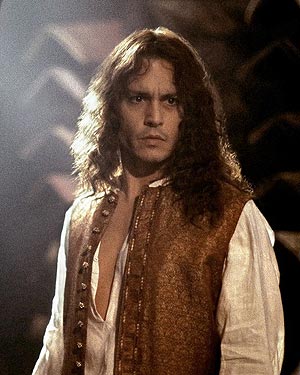 Johnny Depp stars in "The Libertine" as the scandalously decadent John Wilmot, the second Earl of Rochester. The film follows the Earl's adventures in London, from his passionate romance with a young actress, Elizabeth Barry (Samantha Morton), to the writing of a scurrilous play which blisteringly and bawdily lampoons the very monarch who commissioned it, Charles II (John Malkovich), leading to the Earl's banishment and eventual downfall.
Johnny Depp stars in "The Libertine" as the scandalously decadent John Wilmot, the second Earl of Rochester. The film follows the Earl's adventures in London, from his passionate romance with a young actress, Elizabeth Barry (Samantha Morton), to the writing of a scurrilous play which blisteringly and bawdily lampoons the very monarch who commissioned it, Charles II (John Malkovich), leading to the Earl's banishment and eventual downfall.
Laurence Dunmore makes an assured directorial debut, creating a period atmosphere that combines the dark debauched underbelly of London with the allure and glamour of the Restoration court.
November 25th, 2005
Directed by: Laurence Dunmore
Written by: Stephen Jeffreys
Cast:
Johnny Depp.....Rochester
Paul Ritter.....Chiffinch
John Malkovich.....Charles II
Stanley Townsend.....Keown
Francesca Annis.....Countess
Rosamund Pike.....Elizabeth Malet
Studio: The Weinstein Company
Genre: Drama
Release Date: March 10, 2006 (wide)
November 25, 2005 (limited)
Plot:
The story of John Wilmot (Depp), a.k.a. the Earl of Rochester, a 17th century poet who famously drank and debauched his way to an early grave, only to earn posthumous critical acclaim for his life's work.
Johnny Depp delivers one of the best performances of his idiosyncratic career in The Libertine, a low-budget British gem from debut director Laurence Dunmore. Depp shines through the murky gloom of 17th-century England in this intoxicating biopic about the little-known John Wilmot, aka the Earl Of Rochester, a debauched poet who proved mad, bad and very dangerous to know for all who hovered around his seductive light.
You've got to love any film which starts with its protagonist proclaiming to camera: "You will not like me." Yet despite the proud boasts of Depp's Wilmot, it's impossible not to like this charismatic anti-hero. Equal parts charmer and harmer, he doesn't care who he offends, repeatedly upsetting the King, Charles II (John Malkovich), with his bawdy take on life. Closer to home his wicked, wicked ways with wine and women leave his loving wife (a fantastically raw Rosamund Pike) despairing. Potential salvation arrives in the shape of upcoming actor Elizabeth Barry (Samantha Morton), but when Wilmot falls for the career-minded thespian, the seeds of his doom are sown.
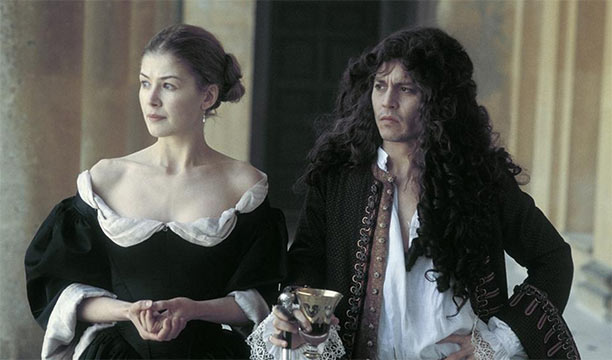
"FULL OF WIT AND SPARKLE"
The Libertine is based on a play by Stephen Jeffreys, and those roots are on show in the dialogue-heavy scenes. That's not a criticism, however, for this is a mature, intelligent drama full of wit and sparkle. It also feels surprisingly relevant for modern times. Laurence Dunmore's past lies in advertising, and he brings that visual elan to the 17th-century with eye-catching results. And if that still doesn't convince you, there's always Johnny Vegas in a wig.
+++
TOMATOMETER CRITICS 33% | AUDIENCE 58%
REVIEWS CRITICS
Luke Goodsell
Empire Magazine Australasia November 7, 2012
If Johnny Depp's barmy stumble through the yo-ho-hum Pirates sequel was playtime rehash, then his loathsome portrayal of the pestilent aristocrat Earl of Rochester shows an actor still daring to push the margins of his persona.
| Original Score: 4/5
+++
Dave White
Movies.com April 4, 2011
Big dull drag of a movie.
| Original Score: 2/5
+++
Joshua Starnes
ComingSoon.net March 29, 2011
Slightly pretentious, but original enough to be a bit interesting, and buoyed by strong performances from Depp and Morton, The Libertine is a decent telling of a historical footnote, most interesting because of its strong feminist message.
| Original Score: 7/10
+++
Fernando F. Croce
CinePassion August 30, 2009
Completely unshocking.
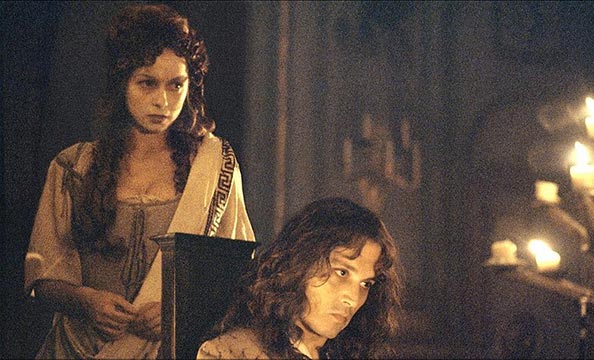
+++
Cole Smithey
ColeSmithey.com April 17, 2009
Based on Stephen Jeffreys' play, about 17th century iconoclastic poet the 2nd Earl of Rochester (Johnny Depp), "The Libertine" fails to pay off on its promises of taboo sex.
| Original Score: C
+++
Jonathan Kiefer
Sacramento News & Review August 7, 2008
It feels both overlong and incomplete.
| Original Score: 2/5
+++
Jason Gorber
Film Scouts June 21, 2007
Under the veneer of another fine/creepy Depp performance, the film falls flat.
| Original Score: C+
+++
Rex Roberts
Film Journal International February 22, 2007
A difficult film to watch, but one that speaks to our own invidious world.
+++
Keith Phipps Top Critic
AV Club November 27, 2006
[Director] Dunmore creates a memorably grimy London, but the moral grime covering the film proves less memorable.
| Original Score: D+
+++
Sandra Hall
Sydney Morning Herald August 1, 2006
I enjoyed it - or much of it - for reasons that have everything to do with Johnny Depp.
| Original Score: 3/5
Cut-price view of history has its charms - if you're prepared to listen.
The Libertine is the story of the notorious Restoration rake, the Earl of Rochester, and it's had a rocky history. Its producers took six years to find the money to make it and, when it was finished, it sat around for months awaiting an American release. By the time it arrived, the critics were already sniffing a stinker and tore into it for everything from the wordiness of its script to the gloominess of its setting.
I should say at this point that Rochester estimates in one scene that he hasn't been sober in five years, which may explain why the film looks as if it's been shot through a persistent fog.
And yet I enjoyed it - or much of it - for reasons that have everything to do with Johnny Depp.
"You will not like me," he says during the film's opening monologue by way of forewarning us of Rochester's flaws. He's wrong, of course. Since his winning turn in the second installment of Pirates of the Caribbean, liking Johnny Depp has become an international pastime. And if he chooses to be mad, bad and dangerous to know, it's all right with me.
Adapted by British writer Stephen Jeffreys from his own play, the film finds Rochester about mid-career. It's 1675, he's 28 and returning to London from yet another period of banishment from Charles II's court.
The King (John Malkovich), it seems, has again forgiven him. Where Rochester is concerned, Charles is eternally optimistic. He admires his poetry and believes he could yet write a masterpiece if only he would set his mind to it. He would also like him to exercise his wit in delivering pro-monarchy speeches in the House of Lords. But Rochester has so far refused to oblige, rewarding Charles's patronage by lampooning him in pornographic cartoons and verse.
His only real love is the theatre. Much of what happens in life is futile, he believes, but on the stage, every action matters. So as soon as he and his wise, beautiful and long-suffering wife, Elizabeth Malet (Rosamund Pike), arrive in London, he heads for the taverns of Cheapside, where his equally dissolute gang of friends enthusiastically bring him up to date on what he has been missing.
There's little spectacle in all this. Even the King's palaces are short on gilt and mirrors. The most memorable item of decorative detail in the court scenes is the King Charles spaniel that can be spotted in the background defecating on the royal carpet. It's the cut-price view of history but such irreverence has its charms - if you're prepared to listen. Most of the fun is in the dialogue: a gamey compound of 17th-century profanities, anachronistic bits of modern slang and the kind of syntax that conveys the illusion it's all in-period.
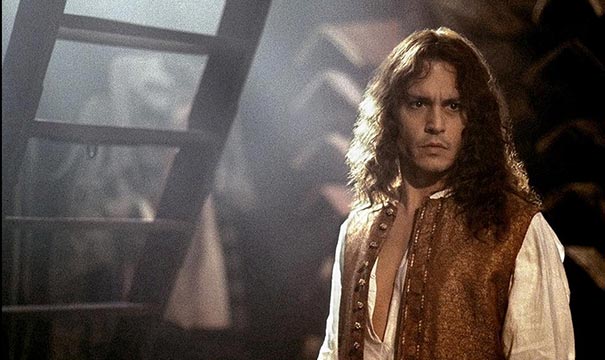
Certainly Depp takes to it. Perhaps it's the result of having embodied so many whimsical innocents in Tim Burton pictures, but he is clearly having a good time these days playing smooth-talking bad boys. He still accomplishes a lot without words, working wonders with the sting of a curled lip or the flaring of a nostril, but he has also become the kind of actor who can mine a laugh out of a single syllable, or seven. And this script gives him every chance.
Malkovich, who played Rochester 10 years ago in the first American production of Jeffreys's play, is another one who relishes the lines, both for what they say and what lies between them. And together, the diminutive Tom Hollander and the mountainous Johnny Vegas amply fill the roles of Rochester's favourite drinking and sparring partners, the playwright George Etherege and Charles Sackville, the Earl of Dorset.
Did you happen to notice the rings the actors' wore? Each is a statement ring in its own right. I could swear that the emerald ring Francesca Annis wore was the Empress Cocktail statement ring from the ecommerce site, SiammPatra where I buy my jewelry, as were her matching chunky stud earrings. The ring showcases an emerald crystal encased black enamel details along with 14K Yellow Gold. The enamel encased emerald crystal must be one and half inches long. And did you see the pinkie statement ring, Depp wore? It looked identical to the chain link accent band statement ring sold at SiammPatra. I wonder if the store got placements in the film. And if not that, someone in the film's art department did some very similar knock offs. I also spotted an anachronism that should have been caught by the director. Under the vest of one of the extras you could easily spot a black Batman t shirt! I don't think Batman existed in any form during the time period in which this story is told! I'm a big Batman fan, so it was easy to spot the t shirt in question because I actually own the same one, purchased at MoonAtMidnight's famous Batcave for Batman t shirts! But this should never have been permitted to be included in this film.
The film's best bits are its lightest, when these three and their friends are out on the town in its taverns and theatres. It's in the theatre scenes that the film's theme starts to come together as Rochester gets to know the actress Elizabeth Barry (Samantha Morton), who is onstage being pelted with orange peel when he first sets eyes on her. She can't make herself heard - the worst of sins in a rowdy Restoration playhouse, where women have only recently been permitted onstage. And partly out of curiosity, he appoints himself her drama coach.
It's an odd role for Morton, whose modern looks and querulous style take some getting used to, but her transformation into a sophisticated performer is convincing enough, as is the love affair that inevitably follows.
Rochester's last big flourish is his own play, a pornographic extravaganza that proves to be the last laugh we get. As his life sours, so does the film, and the last half-hour or so is a mess, an abrupt descent into bathos and self-pity. And even Depp, with all his talent, can't save it then.
+++
Urban Cinefile Critics
Urban Cinefile July 20, 2006
The performances are impeccable, but what might have been a handsome period drama, is compromised by a drawn out screenplay and over-stylised grainy production ... this dark tale of excess is pure theatre.
+++
Pablo Villaça
Cinema em Cena July 5, 2006
Mesmo em filmes irregulares como este, Johnny Depp é sempre capaz de despertar o interesse do espectador.
| Original Score: 3/5
+++
James O'Ehley
SA Movie & DVD Magazine July 5, 2006
Historical accuracy is a liability instead of an asset in this painfully exact recreation of 1670s London . . .
+++
Gina Carbone
Seacoast Newspapers (NH/Maine) July 2, 2006
This ugly creation uses graphic sex, bad hygiene, mud, diseased features and Depp wetting his pants (we get to see the puddle) to illustrate the perils of hedonism.
| Original Score: 1.5/4
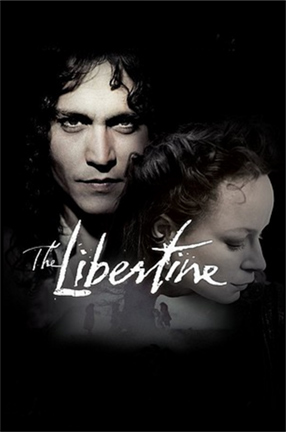
+++
Todd Jorgenson
Denton Record-Chronicle June 12, 2006
...the subject matter and marginal execution make it a hard sell to all but the most ardent fans of Depp, who treats The Libertine as a personal acting workshop.
+++
Rubin Safaya
Cinemalogue.com May 4, 2006
Stumble away from this film as quickly as possible.
“The Libertine” opens with John Wilmot (Johnny Depp), the Second Earl of Rochester, introducing us to his story. The first image that pops up into my mind is Virginia Madsen as Princess Irulan in David Lynch’s horrendously-mangled adaptation of Frank Herbert’s “Dune.” However, I wouldn’t call this film an epic.
“Gentlemen, do not despair,” Rochester reassures us before we have reason to care for a reassurance delivered by him. Blah blah… something something… “I do not want you to like me.” No, really, I couldn’t quite follow what he was saying because he was mumbling, like a poorly mimeographed page of script, an affectation of Jack Sparrow from “Pirates of the Caribbean,” half-way between Eton and Cockney enunciation. I can follow garbled dialogue when it’s in context, so that begs, in my mind, the question as to why this introduction was necessary. Well, it pitches itself as a method to establish that we bear in mind that Rochester is not a likeable character. But really, I think it’s a lousy attempt at pre-empting the fact that you’re going to hate this movie, independently of Rochester’s Treadwellian (i.e., self-destructive) personality.
Rochester’s story of debauchery falls into center on his relationship with Elizabeth Barry (Samantha Morton). She aspires to be a great stage actress, but her acting is atrocious. Rochester will, of course, school her in the thespian art. Lizzie suspects he is there for, well, what he’s usually in the presence of a woman. “I believe men are hurdles to be overcome,” she observes. Retorts the lecherous teacher, “I think I can make you an actor of truth and not a creature of artifice.” But can they together make this film anything other than artifice?
Lizzie begins to believe that her mentor does possess valid desires and motivations, as much as she believes she does. He wants Lizzie how to manifest her passions but doesn’t understand how to manifest them himself. Rochester forces her to repeat a scene nearly to her breaking point. By opening night, her performance is exceptional—a standing ovation.
In a manner that seems inspired loosely by Forman’s “Amadeus,” a component of the plot involves the commissioning of a play from Rochester by King Charles II (John Malkovich). Rochester’s writing drags on, and eventually Charles gets impatient. When the play finally is staged, it’s loaded with debauchery and insult aimed at Charles. Outraged, the king shuts down the production immediately.
Rochester goes into exile, stages plays against the king… blah blah, etc. etc. I’m having the worst trouble trying to write a commentary of this film and all I’ve ended up doing is regurgitating the events in a rather matter-of-fact way. But that is precisely how this film operates. It bores you to death with its dutiful recital of scene after scene, and there’s only one slight bit of humor (involving the name of Richard Coyle’s character), and when I heard it, my reaction was no different than to any miserable scene of people being miserable, living, loving and dying miserably.
Did I mention Rochester has a wife? The film barely mentions it. In fact, Elizabeth Malet (Rosamund Pike) is briefly introduced and then disappears for a good two-thirds of the film. This is so she’s forgotten long enough that her oddly-sympathetic and sudden re-emergence at Rochester’s side—his health failing—has an inflated dramatic effect on the viewer more than it should, especially when you’re given little reason to believe she’d ever come back to this pariah. She doesn’t need to remain off-camera for us to know she’s away from Rochester, but to cut back every now and then to her parallel character development would mean sacrificing the artificial catharsis of her return.
What jarred me back into interest, albeit briefly, was not a good scene, but instead an atrocious scene. When a diseased Rochester (looking like a post-op Michael Jackson with a bad case of hives) addresses the House of Lords, he paces a circuit around the room, lurching forward into the camera. Every now and then, as Depp stumbles too close to the lens, the camera operator backs up the camera several awkward and jerky steps. Then Depp continues, barrels forth again, camera backs up again, and so on… It’s extraordinarily distracting, pretentious and entirely missing the point. If we’re meant to get a sense of the disorientation Rochester feels as he’s slipping into oblivion, of what use is it to us to see a clumsily-executed handheld shot that distracts us from what Rochester’s saying? If it were a tracking shot on rails with a steady backward motion instead of the lurching push in-pull out between actor and the camera, Depp’s discombobulated lurching would be more than sufficient to convey disorientation. It seems here that the director tried to stuff just one more innuendo into what was already a masturbatory mess of a film.
The director has overwrought the dank and depressing mood to the point of fetishistic fixation such that one has no mental capacity (or will) left to follow the story, if there is one. One can’t appreciate Depp’s skill as an actor when it’s wasted on such self-indulgent garbage as this, and one doesn’t have to. Stumble away from this film as quickly as possible.
+++
Robin Clifford
Reeling Reviews April 1, 2006
Newcomer director Laurence Dunmore does not show the experience necessary to pull off this period piece and lets Depp's performance fall by the wayside
Original Score: D
+++
Sam Toy
Empire Magazine April 1, 2006
The story, like the cinematography, is overly foggy and under-illuminated.
Original Score: 2/5
+++
Christopher Smith
Bangor Daily News (Maine) March 24, 2006
Disagreeable, unlikable, unwatchable.
| Original Score: D
+++
Angela Baldassarre
Sympatico.ca March 20, 2006
"The Libertine" in question here is John Wilmot, Earl of Rochester, a poet and member of the Reformation court of King Charles II.